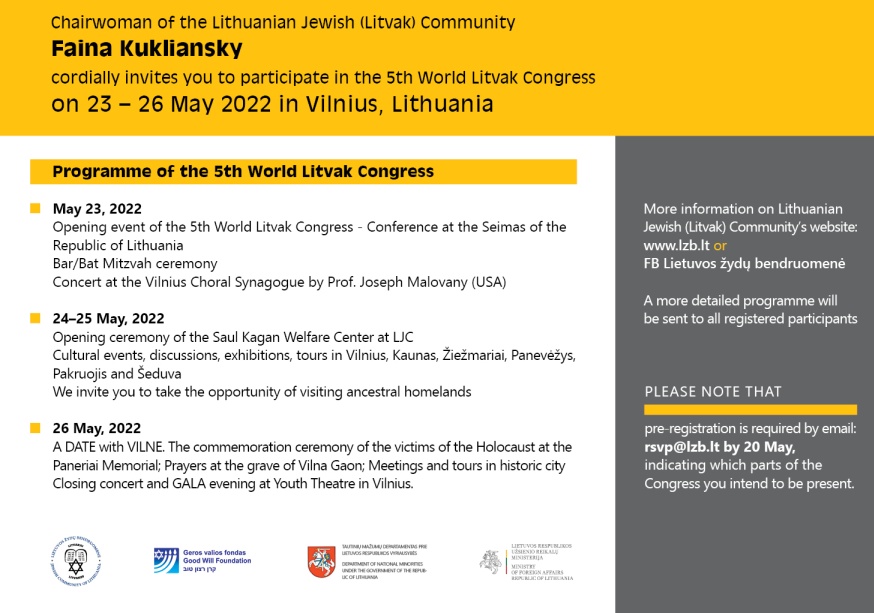
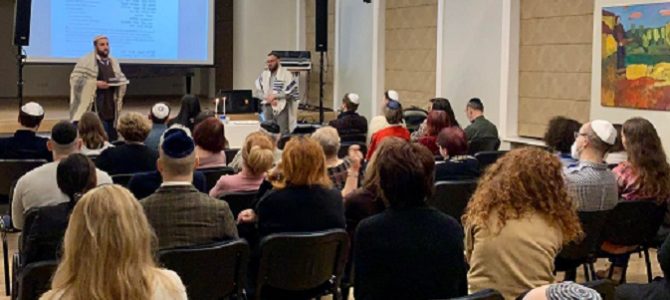
Snapshots of Last Friday’s Kabbalat Shabat
Progressive Rabbi Nathan Alfred from Israel led a Kabbalat Shabat ceremony with about 50 members of the Lithuanian Jewish Community including our seniors and families with children. In the afternoon prior he attended the LJC Seniors Club Abi Men Zet Zich and sang the hymns to usher in the Sabbath. One of our oldest members, Libė Britaniskina, lit the Sabbath candles and the meeting concluded with songs in Hebrew and Yiddish. He led the prayer service and delivered the weekly Torah portion.

Happy Birthday to Aleksandras Rutenbergas
Aleksandras Rutenbergas celebrated his 75th birthday Monday.
We wish our always active member a very happy birthday, good health and good times. Aleksandras, your contribution to maintaining Jewish heritage is great. You helped build the Tolerance Center of the Vilna Gaon Museum at the site of the former theater there. You were always there in the middle when there was work to be done. You introduced Europe to Litvak heritage, organizing two exhibitions of Vilnius ghetto posters in Padua and Strasbourg.
We would like to express our great respect for your good work and your tolerance.
Mazl tov. Bis 120!
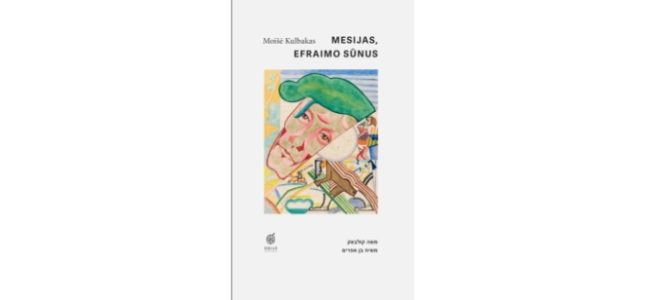
Moshe Kulbak’s Mesiekh ben Efrayim Translated and Published in Lithuanian
Lithuania’s Odilė publishing house has translated and printed a Lithuanian translation of Yiddish writer Moshe Kulbak’s book Mesiekh ben Efrayim under the title Mesijas, Efraimo sūnus. The description by internet vendor knygynas.biz says:
Classic of Lithuanian and world Jewish literature Moishe Kulbak (1896-1937) is known to Lithuanian readers as the author of the wonderful poem Vilne. Finally for the first his prose has appeared in Lithuanian, the novel Messiah ben Efraim. This is one of the most famous and most original of Kulbak’s Yiddish works. It was written in Berlin in 1922 and is suffused with magical realism, something which hadn’t been seen before. The author’s vital and innovative imagination connects surrealistic and expressionistic images here with the oral tradition and strong mystical spirit of Lithuanian Jews. This ensemble recalls the impressive paintings of Marc Chagall.
The novel Messiah ben Efraim is based on a Jewish legend which comes from the Talmud that there are always 36 hidden just men living in the world without whose unseen actions the world would pass away [lamed-vavnik tzadikim or lamed-vavniki]. Kulbak creates a story about these holy people living in historical Lithuanian [Grand Duchy] lands–in Belarus and Žemaitija. Elderly miller Benya, Simkha the rabbi who ran away from his community, the philosopher-bum Gimpel, Christian sauna operator Kiril–these souls trapped in the world seeking the light, guided a strange unease embark on a journey without any explicable destination. During this fantastic trip filled with humor and mystical experiences the cause of this unease driving on the travellers gradually comes into focus: it’s the impending advent of the Messiah to the land of Lithuania.
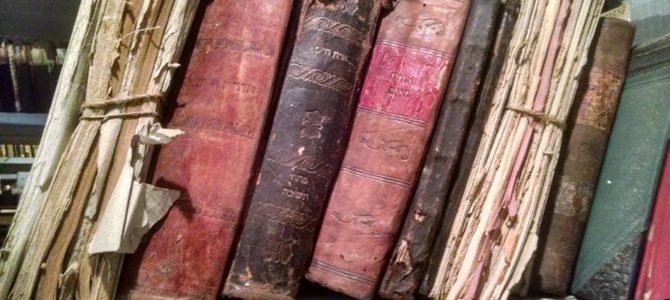
YIVO Vilna Collection Online
Dear Faina,
Today, I am delighted to announce that The YIVO Institute for Jewish Research (YIVO) completed the Edward Blank YIVO Vilna Online Collections Project (EBYVOC), a historic 7-year, $7 million international initiative to process, conserve and digitize YIVO’s divided prewar library and archival collections.
These materials, divided by World War II and located in New York and Vilnius, Lithuania, have now been digitally reunited for the first time.
Comprising approximately 4.1 million pages of archival documents and books, the EBYVOC Project is an international partnership between YIVO, the Lithuanian Central State Archives, the Martynas Mavydas National Library of Lithuania, and the Wroblewski Library of the Lithuanian Academy of Sciences.
The completion of the EBYVOC Project is an epic milestone in the preservation of Eastern European Jewish history and culture. It was completed on schedule and within budget, providing a global audience access to these treasures through a dedicated web portal free-of-charge. We invite you to explore this remarkable collection at https://vilnacollections.yivo.org/.
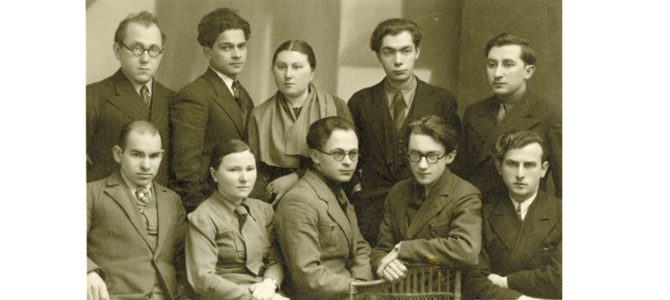
Chaim Grade: Facts of a Life
Photo: Jung-Vilne literary group: Chaim Grade is standing in the top row to the left, the poets Shmerke Kaczerginski and Abraham Sutzkever are seated in the middle. YIVO archives
by Susanne Klingenstein and Yehudah DovBer Zirkind, In Geveb, December 15, 2021
INTRODUCTION
When on May 2, 2010, Inna Hecker Grade passed away at the age of eighty-five, a sigh of relief, unkind and hard-edged, coursed through some corners of the Yiddish literary world and a small circle of scholars and archivists tensed with expectation. For twenty-eight years, since the passing of her husband Chaim Grade on June 26, 1982, the literary legacy of one the most important Yiddish prose-stylists and documentary storytellers to emerge from the ashes of Vilna, had lain concealed in the couple’s Bronx apartment, guarded by his angry widow who deemed the world unworthy of her husband’s genius. After a brief foray into the publishing world, she had withdrawn into a tomb filled with her husband’s treasures.
The sepulchral metaphor was first used by Ralph Speken, the psychiatrist who had taken care of Inna Grade during the last months of her life. On the eve of breaking the seal, Speken pleaded: “They should take over that apartment as if they were taking over King Tut’s tomb.” Scholars and readers expected the discovery of manuscripts in drawers and closets that would speedily be published, perhaps in critical editions, and bring Grade back to literary life. No new work, no critical edition or biography has yet appeared.
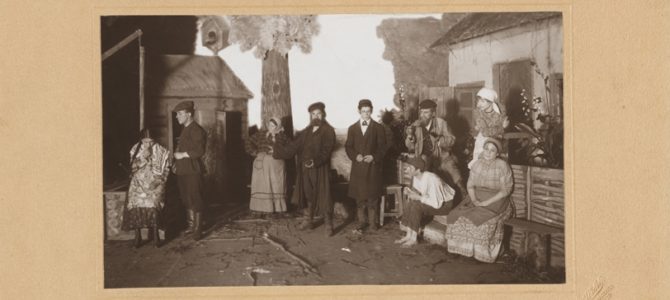
Remembering Documentary Photographer, Author, Screenwriter Alter-Sholem Kacyzne
Photo: Alter Kacyzne. “Green Fields” theater still. ca. 1921. Museum of the City of New York.
text by Yitskhok Niborski, translated from Yiddish by Yankl Salant
Kacyzne, Alter-Sholem (May 31, 1885-July 7, 1941)
(1885–1941), Yiddish writer and critic; photographer. Born in Vilna to a working-class family, Alter-Sholem Kacyzne (Yid., Katsizne) attended heder and also a Russian-language Jewish elementary school. At 14, after his father’s death, he stopped his formal studies. Kacyzne was an autodidact and remained an avid reader not only of literature in Russian, Yiddish, and Hebrew, but also of Polish, German and French works. For about 11 years he lived in Ekaterinoslav where he learned to be a photographer and was married.
In 1909, Kacyzne first published two Russian stories in the periodical Evreiski mir (Jewish World), edited by S. An-ski. In 1910, attracted by the work and reputation of Y. L. Peretz, Kacyzne settled in Warsaw, where he opened a photography studio. He grew very close to Peretz, who became a literary mentor, but did not begin publishing in Yiddish until after Peretz’s death in 1915. Kacyzne’s first Yiddish texts appeared in collections in Vilna and Kiev. In 1919 and 1920 his first two books were published in Warsaw, the dramatic poems Der gayst der meylekh (The Spirit, the King) and Prometeus (Prometheus). He was also a consistent contributor to (and sometimes co-founder and co-editor of) a series of literary periodicals, most of them short-lived, in Warsaw and Vilna, in which he published novellas and stories that in 1922 appeared in book form as Arabeskn (Arabesques).
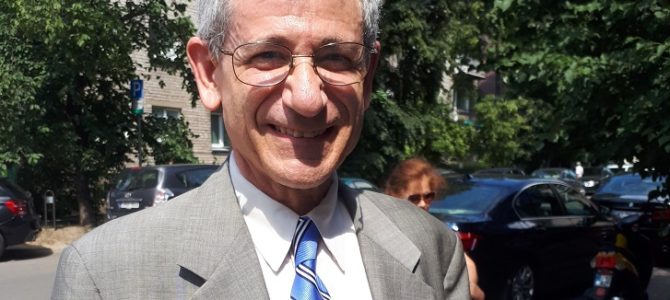
YIVO Director Thanks LJC on Milestone Achievement
Dear Faina,
Today YIVO announces the completion of the Vilna Collection Project–4.1 million pages of documents and books online for people around the world–and you have been such a tremendous part of it. You introduced me to so many people, helped shepherd our grant through the Goodwill Foundation and advised on so many things. Thank you. This project truly opens new doorways for millions of people around the world. Without your support and enthusiasm I am not sure we would have been successful. I hope that when I am in Vilnius … we will be able to celebrate together.
Here is a link to the website: https://vilnacollections.yivo.org/
With my warmest good wishes for a healthy, happy, peaceful New Year,
Jonathan
Jonathan Brent
Executive Director/CEO
The YIVO Institute for Jewish Research
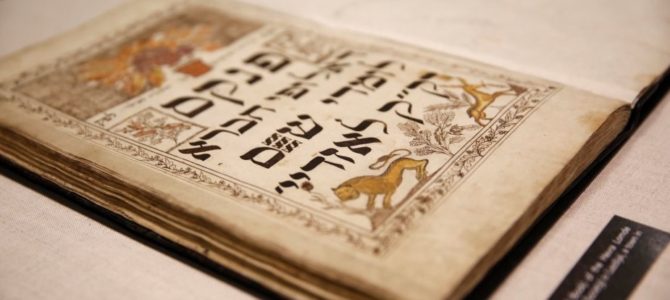
Joint Lithuanian-YIVO Digitization Project Complete

New York-based YIVO has announced the completion of a joint project to digitize the Edward Blank collection in what is known as the Edward Blank Vilna On-Line Collections Project. The historic initiative took seven years and $7 million to complete. The goal was to sort, conserve and digitize pre-war collections from the YIVO library and archives, and to make them available to everyone online.
The project was carried in concert with the Lithuanian Central State Archive, the Martynas Mažvydas Lithuanian National Library and the Vrublevskiai Library of the Lithuanian Academy of Sciences.
Ruth Levine, the director of the board of YIVO, called the completion of the project a new phase in the modern history of the YIVO institute and part of their main mission. She said heroes and martyrs gave their lives to preserve the books and documents in the collection, and expressed gratitude to the Lithuanian partners in the project.
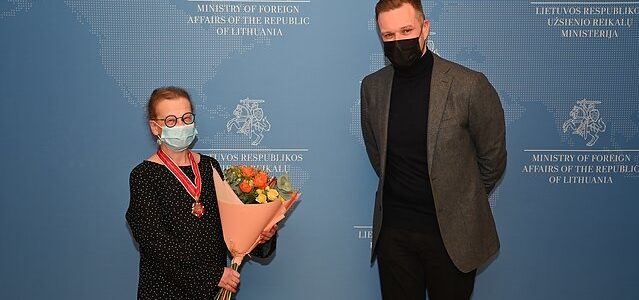
Lara Lempertienė Awarded Prize by Lithuanian Foreign Ministry
Jewish scholar and head of the Lithuanian National Library’s Judaica Center Lara Lempertienė, PhD, was awarded the Star of Lithuanian Diplomacy prize Friday, according to a press release from the Lithuanian Foreign Ministry. Lithuanian foreign minister Gabrielius Landsbergis personally presented her the prize at the ministry in recognition of her work fostering research into Litvak history and cultural heritage, and for her significant contribution to commemorations of the 300th birthday of the Vilna Gaon and 700 years of Litvak history.
“You have made a remarkable contribution in strengthening foreign policy and carrying out our shared mission to spread knowledge of Lithuanian Jewish history and culture,” minister Landsbergis said. The Lithuanian Foreign Ministry has been awarding the Star of Lithuanian Diplomacy since 2010 in recognition of contributions to spreading knowledge of Lithuania internationally and to improving and celebrating international relations.
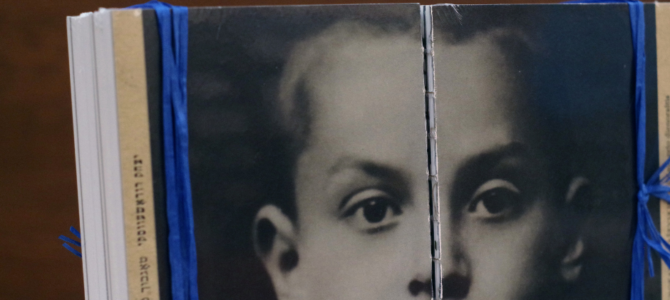
Yitzhak Rudashevski’s Birthday is December 10
December 10, 2021, marks 94 years since the birth of Vilnius ghetto diarist and victim Yitzhak Rudashevski.
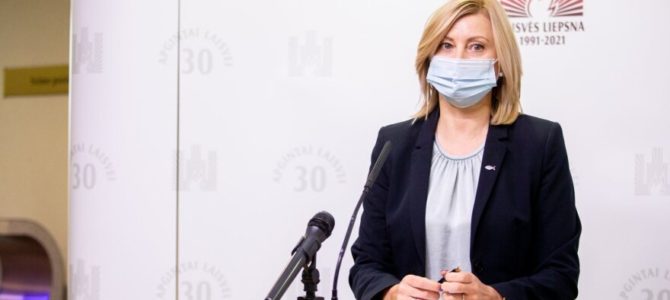
Plans to Revive Shelved Legislation on Ethnic Minorities
Lithuanian MP Rita Tamašunienė, a representative of the Polish Electoral Action/Union of Christian Families party and the alderwoman of the Lithuanian Regions faction in parliament, Thursday announced plans to reintroduce legislation for a Law on Ethnic Minorities drafted back in 2013. It met with disapproval from the Lithuanian parliament’s Legal Department and Law and Order Committee earlier for possibly violating the Lithuanian constitution.
The legislation attempts to define basic principles for protecting the rights and freedoms of ethnic groups, to regulate protection of ethnic minority education, use of languages and cultural values, and to regulate NGO activities.
The draft law provides: “in administrative territorial units where a given ethnic minority lives closely together, local institutions and organization use the (local) language of that ethnic minority along with the state language.” It also says street signs in such areas may include ones in the local minority language alongside Lithuanian signs.
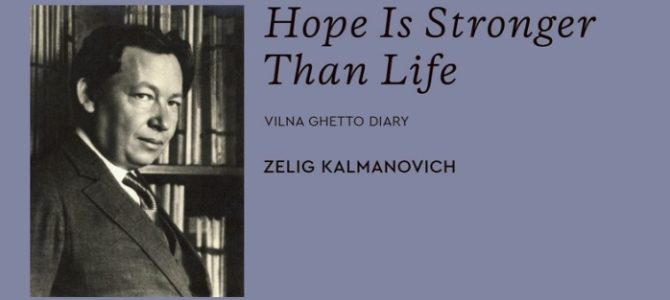
Vilna Gaon Museum Launches Kalmanovich Book
The Vilna Gaon Jewish History Museum is launching two editions of YIVO linguist Zelig Kalmanovich’s diary written in the Vilnius ghetto, in Lithuanian and English, titled Hope Is Stronger than Life. The book will be presented at 5:30 P.M. on Wednesday, November 24, at the Samuel Bak Museum, aka the Tolerance Center, at Naugarduko street no. 10 in Vilnius.
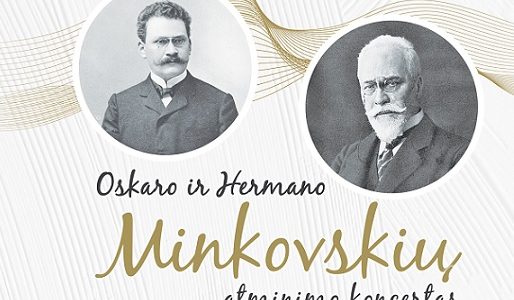
Kaunas Jewish Community Celebrates Minkowski Brothers with Concert
The Kaunas Jewish Community is pleased to invite you to a concert called “Born in Kaunas, Renowned throughout the World: A Concert in Memory of the Brothers Oskar and Hermann Minkowski” at 6:00 P.M. on Monday, November 22, at the Kaunas State Philharmonic located at E. Ožeškienės street no. 12 in Kaunas.
Actor and director Aleksandras Rubinovas will tell the story of Oskar and Hermann Minkowski.
The concert will feature compositions by Litvaks and contemporary Israeli composers performed by the Vilnius St. Christopher Chamber Orchestra.
If you’d like to attend, please fill out this form: https://forms.gle/modjciNNQ1eaixHt7
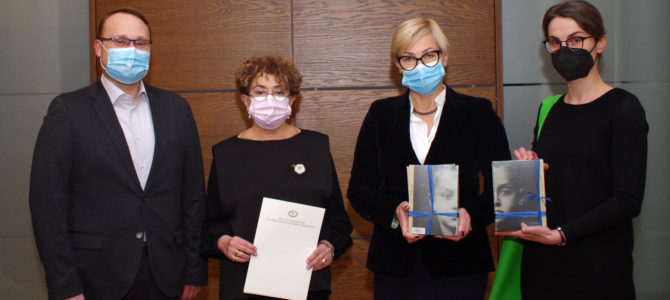
LJC Donates 1,000 Rudashevski Diaries to Lithuanian Schools
The Lithuanian Jewish Community has delivered 1,000 copies of Yitzhak Rudashevski’s “Vilnius Ghetto Diary” in Lithuanian translation to the Lithuanian National Education Agency for distribution to almost all primary school libraries across the country.
At the hand-over ceremony several days ago, LJC chairwoman Faina Kukliansky said the gift will contribute to Holocaust education in Lithuania and that Rudashevski’s diary provides a personal perspective which children are able to grasp more easily. Rudashevski wrote the diary as a teenager from Vilnius. She presented one copy of the book personally as a symbolic gift to Lithuania’s education and athletics minister Jurgita Šiugždinienė on the occasion.
“While we provide the book to the schools, it’s important to remember there were thousands of Rudashevskis,” chairwoman Kukliansky said.
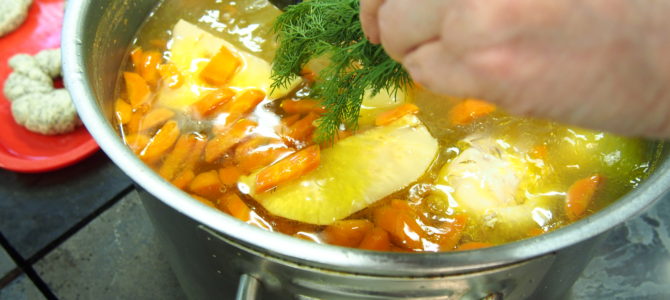
Children’s Cooking Workshop at Community
It was quite a Sunday afternoon at the Lithuanian Jewish Community. We were not able to count the number of children in attendance nor the abundance of food made. We cooked, we baked, we sampled and we did it all over again numerous times. This was the fourth round of the Kinder Tish Sunday school activities. The chicken bullion–Jewish penicillin–was cooking in the pot since 8 in the morning. We’ll be meeting again in two weeks for the Miracle of Hanukkah. #BalabostaRiva
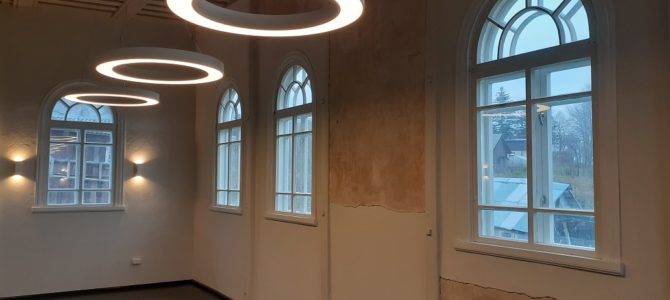
Alanta Synagogue Renovated
The synagogue in the town of Alanta in the Molėtai region stands on slight hill side a little bit away from Ukmergės street on the right-hand side of the Alanta-Molėtai road. It is unique in Lithuania and Europe. It is one of only seventeen surviving wooden synagogues spread across Lithuania. Judging from its shape, it is thought it was built in the late 19th century. The Alanta synagogue is the only surviving synagogue from the Romantic period with an intact interior and interior stairs left in Lithuania.
The renovated synagogue will be handed over to the Molėtai regional administration for managing public use of the state-protected heritage site for cultural, educational and tourism activities including exhibits and tours teaching local Jewish history.
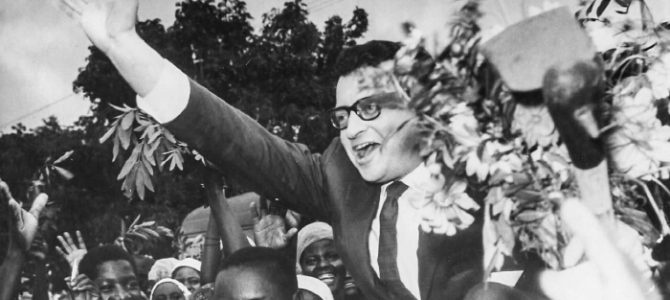
The Unknown Connection between Zambia and Ukmergė
by Rytas Sakavičius
One average day doing my usual thing, scrolling through facebook, an entry caught my eye about a European who is a national hero of Zambia. The most interesting part was his surname, Zukas.
It sounded familiar, but I didn’t really believe it: is it possible we wouldn’t know about this person? We so love stories about people whose ancestors came from Lithuania and it hardly matters whether they identified themselves with Lithuania. Not expecting much, I put “Simon Zukas” into a search engine. The results were suprising. Born July 31, 1925, in Ukmergė [Vilkomir], Lithuania. That’s when I got interested, thinking it strange such an important and exceptional African political figure might be completely unknown in his native land.
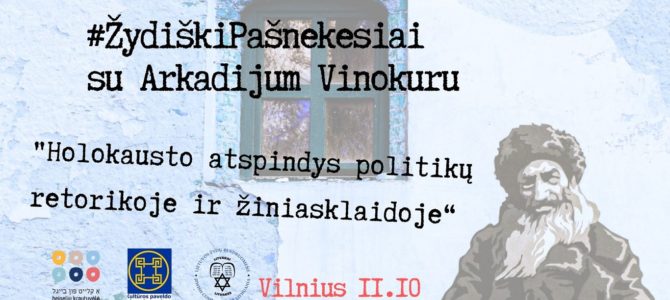
European Days of Jewish Culture Lead to Regular Discussions
The #ŽydiškiPašnekesiai web discussion started as part of the European Days of Jewish Culture this fall, whose motto this year was “Dialogue,” has turned into real-life meetings and discussions. Starting now every second Wednesday of the month will be devoted to discussions of Jewish history and heritage, subtle aspects of history and the issues which came up last fall with political, educational and public figures, held at 5:00 P.M. at the Bagel Shop Café at the Lithuanian Jewish Community, Pylimo street no. 4, Vilnius. There will also be relevant passages of music performed at these events.
The first such discussion is scheduled for November 10 under the title “Reflections of the Holocaust in Political Rhetoric and the Media.” The discussions will likely be held in Lithuanian. Founder of this new discussion club Arkadijus Vinokuras says: “Today only a small portion of Lithuanian society and especially politicians are able to speak at least respectfully about the tragedy which befell us all in the mid-20th century. Yes, all of us, all of Lithuanian society, without regard to ethnicity. It’s important to realize that ‘speaking respectfully’ about the Holocaust is one thing, and understanding the connections between the Holocaust and institutionalized anti-Semitism is another thing altogether. This kind of dualism arises often in speeches by politicians and is reflected in their actions. There are cases in the media (not just in Lithuania) where there is a lack of reflection and ‘innocent’ opinions are expressed, under the alleged right to ‘an alternative view of the holocaust.’ And no, writing the Holocaust uncapitalized is not an unintentional mistake here.”
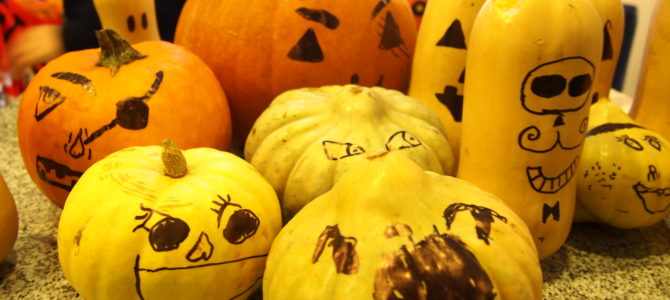
Pumpkins and Bagels: Halloween at the Community
Fun is tricks, costumes, ghosts, pumpkins and screaming children.
Last Friday evening the third Kinder Tish event was held at the Bagel Shop Café. The children made bagels with maple syrup and pumpkin-seed toppings. Friends from the US embassy in Vilnius also attended. We learned all about Halloween, received many horrible gifts and had fun ushering in the Sabbath. Cultural attaché Caitlin Nettleton from the US embassy in Vilnius and colleagues explained Halloween traditions, costumes, tricks and jack-o’-lanterns.

